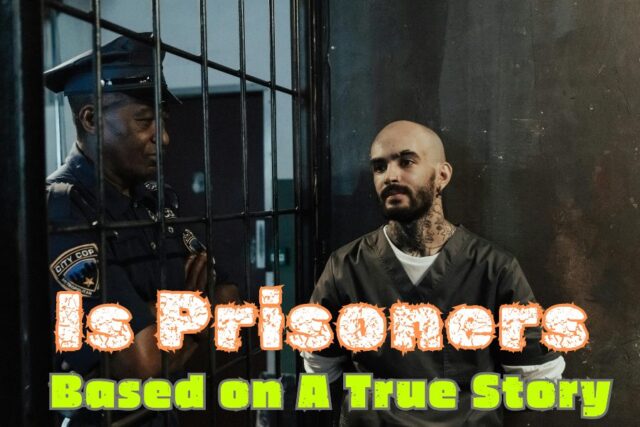This movie took the cinemas by storm with its tragic and compelling story, which might get you wondering, “Is Prisoners based on a true story?”
Hugh Jackman and Jake Gyllenhaal gave some of the best acting of the last few decades in this thriller hit piece and left fans with many questions.
Prisoners is a show that covers all bases and creates a fantastic question of morality and religion. Its incredible casting and the impact it left in the movie industry are unquestionable, so here is more information about the origin and inspiration for the movie;
Is Prisoners Based On A True Story?
Prisoners is not based on a true story. It is a fictional thriller based on a book inspired by various societal conditions, but the specific events depicted never happened.
The book is adapted from the work of Aaron Guzikowski, who wrote the short story that inspired the movie in 2007. It has an interestingly fresh take on religion and morality, making it one of the most complete movies in the genre.
Understanding The Origin of Prisoners
Prisoners is a Jake Gyllenhaal and Hugh Jackman suspense thriller released in 2013 that made waves in the movie world.
The movie features a familiar, crime-driven plot that has made many people curious about the true origin of the story.
The movie centers around the kidnapping of two young girls from a suburban neighborhood and the lengths their parents are willing to go to get them back.
The father gets desperate and resorts to some inhumane and illegal options, and that is the focus of the movie’s message.
The movie was a critical and financial success that got several award nominations. It had incredible editing and cinematography that painted a sad and dark mood, standard in true crime films. This further pushed the idea that it was based on a real-life event.
Director Denis Villeneuve did a fantastic job with the movie, and it resembled stories like Adam Walsh. The arc of Detective Loki’s investigation makes the show appear like most kidnapping investigations.
The grounded nature and outstanding acting in the movie create a realistic image of what it’s like for a parent to be stuck in a crime like child abduction. These deep questions and realism make most people assume the movie is based on real kidnappings.
Prisoners is an original story written by screenwriter Aaron Guzikowski in 2007, and the rights for the movie were bought soon after he completed it. The script was, however, stuck in production for several years before Denis Villeneuve took it up.
The original story was about a child hit by a car, and the driver drives off, so the father finds him and throws him in a well in the backyard. Denis changed this premise and went the kidnapping route to add more suspense and make the story more compelling.
Many people still believed that some events inspired the stories, but Guzikowski denied it in an interview with the LA Times. He said he wrote the story, heard about similar cases in the news, and was surprised by the patterns.
There was some truth to this story since there were increased numbers of child kidnappings in the years after he had written to movie. A movie as good as Prisoners had several inspirations, the other being Edgar Allan Poe.
Prisoners combined Guzikowski’s short story and “The Tell-Take Heart” by Edgar Allan Poe. The Tell-Tale Heart is a story told from the perspective of a man who murders his roommate, dismembers his body, and buries it under his home.
This concept resembles how the Holly family hides the children in a pit in their backyard. The Tell-Tale Heart narrator gets increasingly nervous as the police interrogate him, and he hallucinates about hearing the victim’s heartbeat through the floorboards.
Eventually, his actions and thoughts torment him, and he breaks down and confesses his wrongdoing. Kelley is also locked in a pit after confronting the villain, and police canvas the crime scene, but they don’t find any evidence of him that night.
The detective, Loki, stays behind after the police leave and hears whistling from the pit. The sound gets louder as he moves closer as the movie ends. The film carries similarities from these two projects, and their combination makes it a timeless masterpiece.
The Prisoners Movie Analysis and Message
The storyline in Prisoners is tied to morality, religion, and how they affect each other. Both aspects are well expressed through the main character, Keller Dover, played by Hugh Jackman. Keller is a good man who is forced to commit horrible crimes, which he would never do.
This happens through his daughter’s disappearance, and Prisoners explores Keller’s descent into madness and desperation as he tries to find his daughter. The most evident theme in Prisoners is morality, considered right or wrong.
The blurriness of this line is shown by how Keller treats Alex Jones, who is the main suspect in kidnapping Keller’s daughter. Keller tortures and questions Alex Jones about his daughter’s disappearance despite having no proof of the crime.
His use of torture is a last resort to help his daughter because, in his eyes, every day she is missing is a day that could be her last. The story forces the viewer to put themselves in Keller’s shoes.
What Keller is doing is wrong; he has taken an innocent man by all appearances and started torturing him. In a normal circumstance this would be a criminal act. But when you put yourself in his position, his desperation rationalizes his actions.
This creates a moral problem for the character and viewers, where they must do something wrong to achieve something good. The show portrays parents’ fear and anger when dealing with potentially dangerous situations for their kids.
The movie also features Nancy and Franklin Birch, who Viola Davis and Terrence Howard play. They are the parents of another girl who is kidnapped alongside Keller’s daughter, and they are all willing to do anything to find someone they love.
The movie involves Nancy and Franklin in the torture to show that any parent would do the same and would condone immoral actions through such situations. These characters are desperate enough to do things that go against what they believe in.
If they do nothing, then it means their children will suffer, and this is the worst thing that can happen to a parent. Holly Jones claims that taking a child from a parent brings out darkness and leaves a shadow of what they used to be.
The movie gets more fascinating since Keller isn’t the only one using torture. He inflicts physical pain on Alex Jones, and Jones, in turn, tortures Keller mentally since he is hiding information from him.
It is as though Alex puts Keller in a mental prison with two choices: accept defeat and lose his child, or continue going against his nature and torture Alex. It becomes a game to see who can withstand the torture longer, but Keller has religion behind him.
Keller uses religion to rationalize violence and make himself feel better afterward. At the beginning of the movie, Keller prays before killing a deer. Throughout the film, Keller shows his religious side by praying throughout torturing Alex Jones.
Detective Loki, played by Jake Gyllenhaal, has a priest on his suspect list who was found with a dead body under his church. He interrogates and threatens the priest several times throughout his investigation.
The theme of religion comes up several times in the movie, and it points out how religion is useless as it can be twisted.
Some people use religion for comfort, while the movie shows a darker side where people use it as an excuse for torture.
Keller uses religion for forgiveness before or after he does something he knows to be wrong. He prays before killing a deer so that, in his mind, he has made the action acceptable, just like he prays before torturing Alex.
The movie tries to point out how pointless religion is, and Holly Jones and her husband kidnap children to prove that.
According to Holly, making children disappear is the war they wage on God since it makes people lose their faith.
The scary thing is that the movie proves she is right through Keller’s transformation from an ordinary, loving man to a monster capable of torture. In a way, everyone in Prisoners is a prisoner to something, much like in the real world.
Conclusion
You now have your answer if you wonder, “Is Prisoners based on a true story?” The movie has a lot of scenes and sequences that seem reminiscent of real stories and other films, but the whole thing is fictional.
No actual events happened to lead to the creation of Prisoners. The movie came out 6 years after Aaron Guzikowski originally wrote it.
The movie is one of the best in the genre, encompassing good acting, striking visuals, and a compelling story. It sheds light on morality and religion and how desperation blurs their lines.














